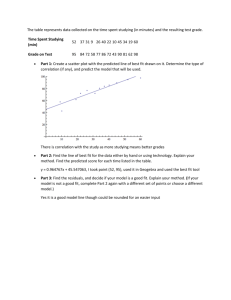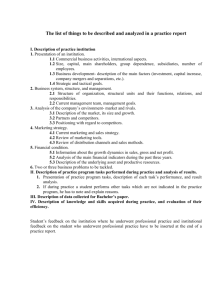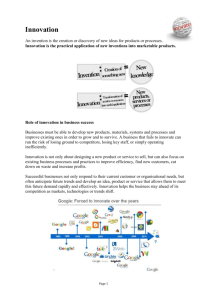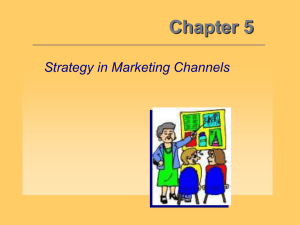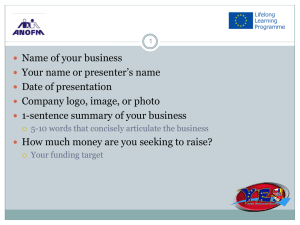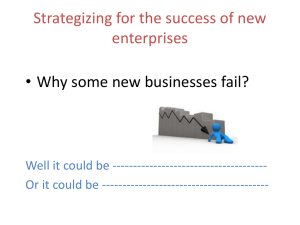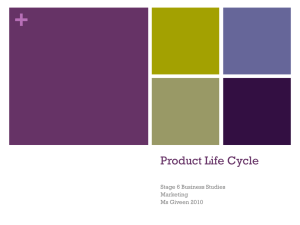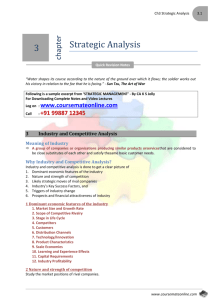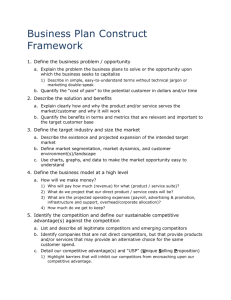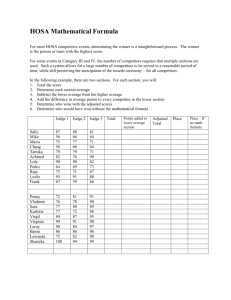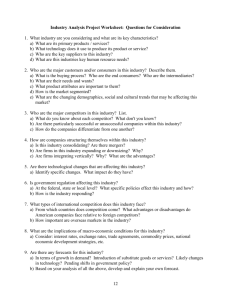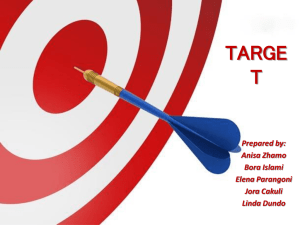Business Plan: Industry, Customer, Competitor Analysis
advertisement
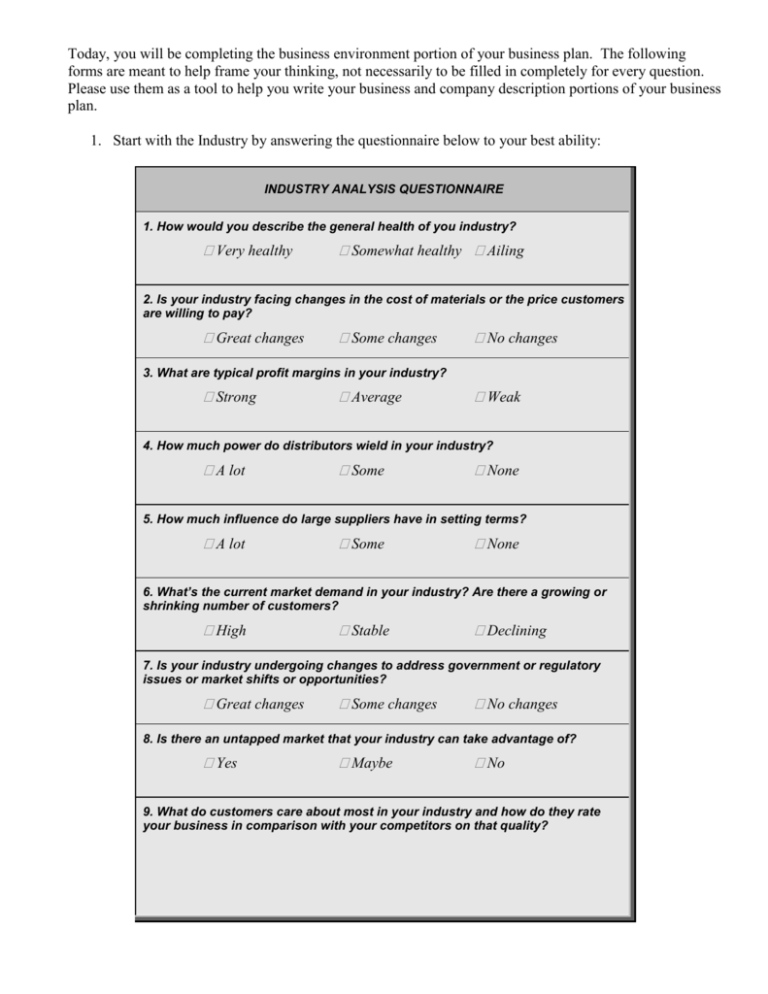
Today, you will be completing the business environment portion of your business plan. The following forms are meant to help frame your thinking, not necessarily to be filled in completely for every question. Please use them as a tool to help you write your business and company description portions of your business plan. 1. Start with the Industry by answering the questionnaire below to your best ability: INDUSTRY ANALYSIS QUESTIONNAIRE 1. How would you describe the general health of you industry? Very healthy Somewhat healthy Ailing 2. Is your industry facing changes in the cost of materials or the price customers are willing to pay? Great changes Some changes No changes 3. What are typical profit margins in your industry? Strong Average Weak 4. How much power do distributors wield in your industry? A lot Some None 5. How much influence do large suppliers have in setting terms? A lot Some None 6. What’s the current market demand in your industry? Are there a growing or shrinking number of customers? High Stable Declining 7. Is your industry undergoing changes to address government or regulatory issues or market shifts or opportunities? Great changes Some changes No changes 8. Is there an untapped market that your industry can take advantage of? Yes Maybe No 9. What do customers care about most in your industry and how do they rate your business in comparison with your competitors on that quality? 10. How much bargaining power do big customers have in your industry? A lot Some None 11. How much is your industry affected by technological change? Greatly Somewhat Very little 12. How difficult is it for new competitors to enter your industry and market area? Very difficult Difficult Easy 13. How many businesses compete directly with your business? Many Some Few 14. Have any competitors in your market area recently gone out of business? Yes No 15. Have new competitors recently entered your market? Yes No 2. Now consider your customer base. Who are your potential customers? CUSTOMER PROFILE QUESTIONNAIRE Geographics Where do your customers and prospects live? Knowing this information helps you target your marketing efforts. List neighborhoods, zip codes, counties, states, or international regions that include concentrations of customers. You can collect information off checks or invoices, data from credit card transactions, or zip code information at the time of purchase or using surveys. List the areas where inquiries come from. Monitor the origin of incoming phone calls, ad and direct-mail responses, and Web site visitors. Demographics What are the facts about your customers? Knowing this information helps you direct media and promotions directly at the people who match your customer profile. Gender: __ % Male __ % Female Age: __% under 12 __% 13-19 __% 20-30 __% 30-40 __% 50-60 __% Senior citizens Education level: __% High school graduates __% Advanced degrees __% College graduates __% Current students Household composition: Find out whether most of your customers are single, married, divorced, widowed, parents with children at home, couples with no children at home, heads of families, grandparents, recent empty-nesters, and so on. Income level: Into which income levels do they fall? Other facts: Do most customers own or rent their homes? What is their nationality? Ethnicity? Language? What are their occupations? Behavioral Patterns What makes your customers tick? Knowing this information helps you create marketing messages that interest prospects and move them to action. Interests: What are their favorite hobbies or pastimes? What magazines, TV shows, types of music, Web sites, social media networks , or other media do they use? Beliefs: What opinions do they hold? Do they have strong social, religious, or political affiliations? What do they value? Purchasing patterns: Do they buy on impulse or after careful consideration? Are they loyal customers or highly susceptible to competing offers? Are they cost-conscious or are attributes, such as quality or prestige, of more importance? Do they prefer name brands? Do they use the Internet to gather information? Do they make buying decisions on their own or based on the advice of others? CUSTOMER SNAPSHOT OUR TARGET CUSTOMERS CAN BEST BE DESCRIBED AS_________________ ____________________________________________________________________ THESE CUSTOMERS ARE LOOKING FOR________________________________ ____________________________________________________________________ WE WILL REACH MANY OF OUR TARGET CUSTOMERS THROUGH__________ ____________________________________________________________________ THESE CUSTOMERS WILL BUY FROM US RATHER THAN OUR COMPETITORS BECAUSE THEY______________________________________________________ ____________________________________________________________________ 3. Finally, take a look at your key competitors and their strategies: OUR BIGGEST COMPETITORS AND THEIR LIKELY MOVES Competitor 1. 2. 3. 4. 5. Key Capability Likely Strategic Move POTENTIAL STEALTH COMPETITORS QUESTIONNAIRE 1. What technologies could change your business overnight, and what companies might make them happen? 2. What businesses can you think of that might consider expanding into your markets in the future? 3. What companies might develop products and services to compete directly with you in the future? 4. Which of your customers could potentially become your competitors? 5. Which of your suppliers or vendors could turn around and compete with you? 6. What businesses might convince your customers not to buy or to buy radically different alternatives to your offerings, and how can you block their appeals with new messages and products?
